The research “How Russian propaganda works on the example of publishing “internal trust ratings” in reputable foreign media”, conducted by the Research and Analytical Group INFOlight.ua (a joint project of the NGO Democracy Foundation and the Hanns Seidel Foundation in Ukraine), published on the portal online.ua.
On November 28, The Economist published an article titled “Russia is poised to take advantage of political splits in Ukraine ” (“Russia is poised to take advantage of political splits in Ukraine”). The article refers to “cracks” between the country’s military and political leadership and claims that the relationship between President Volodymyr Zelenskyy and the Armed Forces Commander-in-Chief Valeriy Zaluzhnyy has allegedly become “terrible.”
How propagandists used the scandalous article by The Economist
The INFOlight.ua team used Osavul, an artificial intelligence-based monitoring system, to determine that the article was first published in Ukraine in translation by journalist Yuriy Nikolov at 10:50 p.m. The journalist added his own comments and assessments to the article.
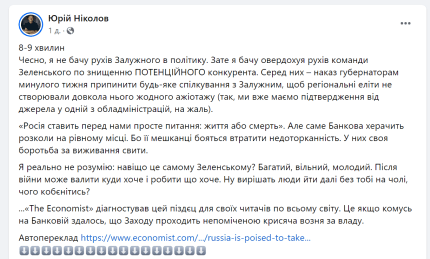
Already at 23:03, Nikolov’s publication was distributed by former government official Volodymyr Omelyan, and at 23:38, the pro-Russian Telegram channel Politika Krainy published its version of the article.
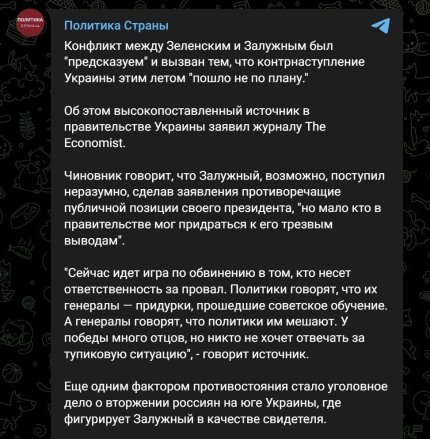
According to INFOlight.ua, these two sources spread further.
It was spread both on Facebook, mostly with reference to Yuriy Nikolov, and in pro-Russian Telegram channels.
Spreading the narrative in pro-Russian Telegram channels
Separately, the Ukrainian version of the Politics of the Country was distributed by fugitive blogger Myroslav Oleshko, who was put on the wanted list by the SBU.
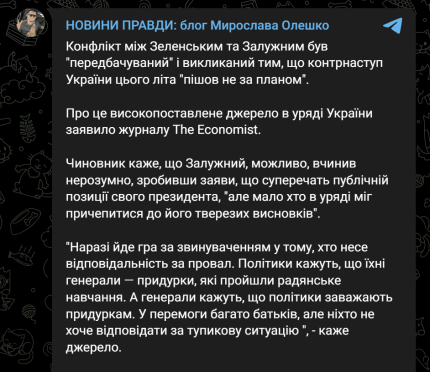
As of the morning of November 29, the narrative about the “terrible” relationship between Zelensky and Zaluzhny was actively spread by Russian Telegram channels.
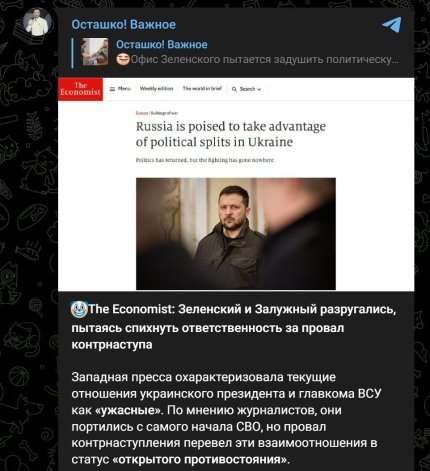
At 9:50 a.m. on November 29, the pro-Russian Telegram channel ZeRada published another “sociological survey” with a reference to USAID:
We were surprised by a closed November poll commissioned by the Americans (USAID) and conducted in Ukraine. There is a very interesting questionnaire (wording of questions) that reveals the intent of the research objectives.
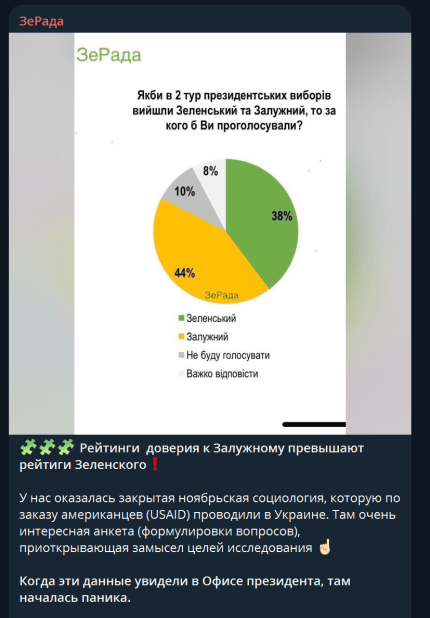
Later, these two sources were disseminated separately and together among pro-Russian sources.
Poisoning of Budanov’s wife and Russian propaganda
To this was added “analytics” in which the poisoning of Kirill Budanov’s wife was explained as a means of “shifting emphasis” and “buying time” in connection with the “failure of the Armed Forces” and “falling ratings”.
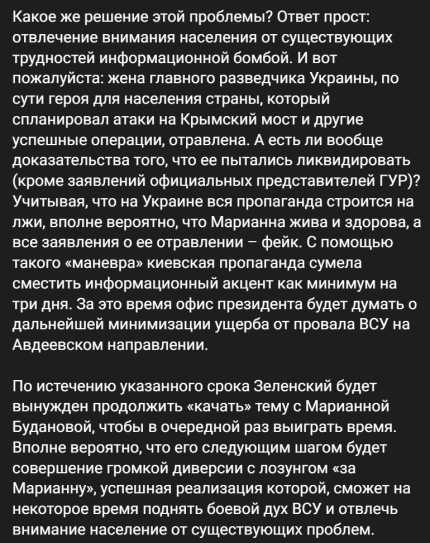
Another pro-Russian Telegram channel launched a narrative that the publication in The Economist is “another step by the West to remove Zelensky and put Zaluzhny or Budanov in his place.”
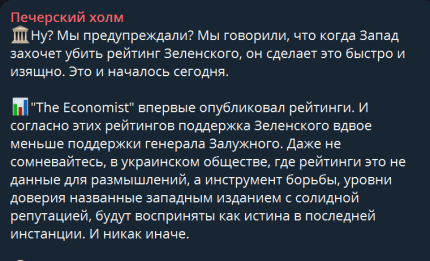
OP’s reaction to The Economist article
Advisor to the head of the Office of the President of Ukraine Mykhailo Podolyak said on Radio Svoboda that the Ukrainian leadership is having “situational discussions” rather than a conflict.
We insist that there is no conflict. I would like to emphasize once again that President Zelensky is in constant communication with Mr. Zaluzhny. Of course, there is a situation where we need to hold certain conversations at the rate, taking into account how our offensive operations are progressing, what adjustments need to be made, what needs to be done to make it more effective. But I emphasize once again that these communications are daily in a working format.
He noted that the Kremlin is interested in internal political conflicts in Ukraine.
Information attack “Maidan-3”
On November 13, online.ua published an exclusive article “Panic, despair, persecution, assassination attempts. Russia has launched a new information attack “Maidan-3″ on Ukraine”.
The new operation is overseen by the First Deputy Chief of Staff of the Russian Presidential Administration, Sergei Kiriyenko, and its ideologist is Vladislav Surkov, who is known as one of the authors of the Novorossiya project.
The goal set by Russian special services and propagandists is to destabilize political life, provoke protests and conflicts in Ukraine itself, and influence the international anti-Putin coalition. The methodology of Russia’s new information attack will remain traditional for Russian ISIS – panic, despondency, and artificial pitting of politicians and the military.
The key role will be played by propaganda on the Telegram messenger, which is of Russian origin. Moscow has already allocated $230 million for this purpose.

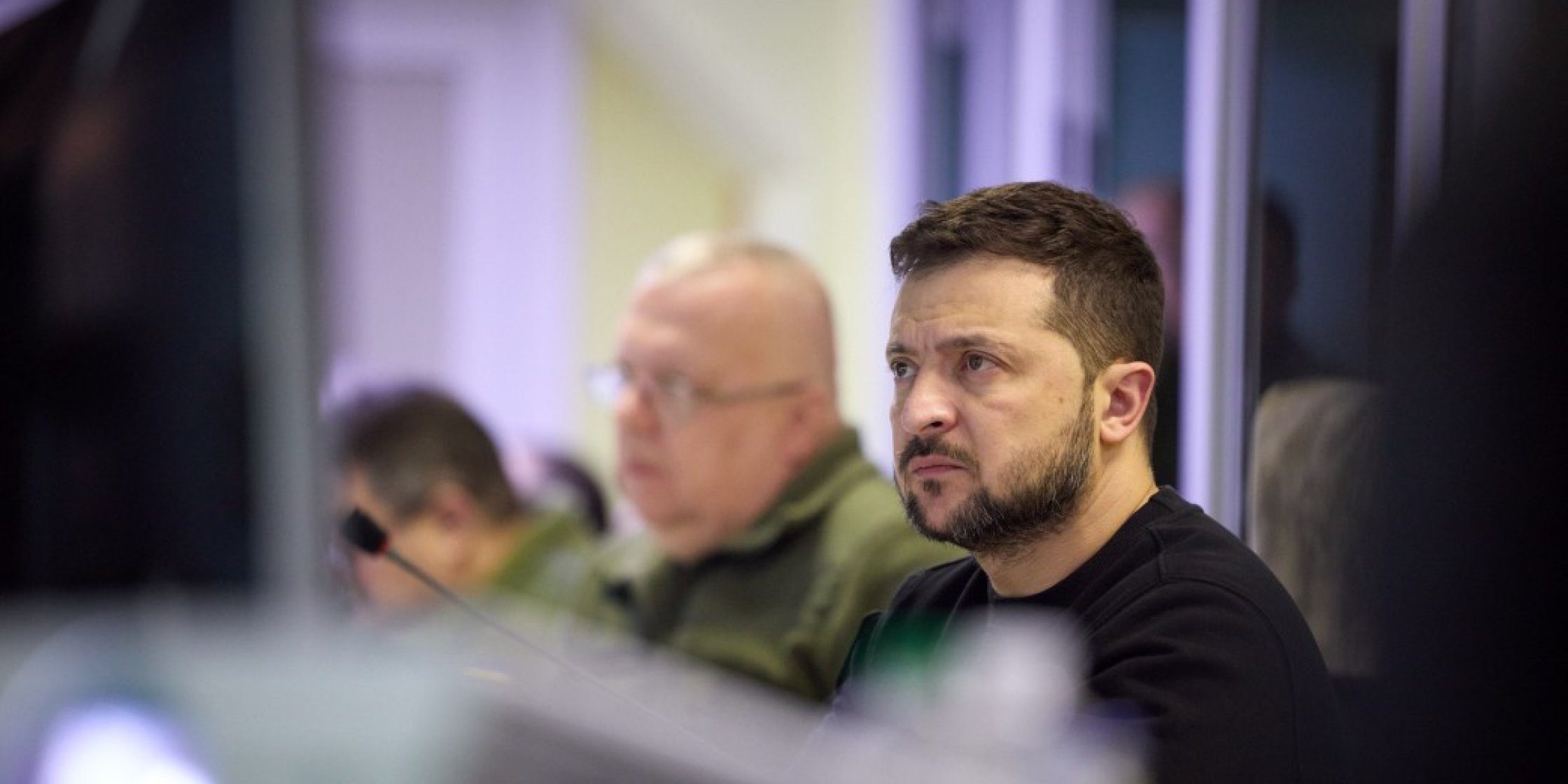
Leave a Reply